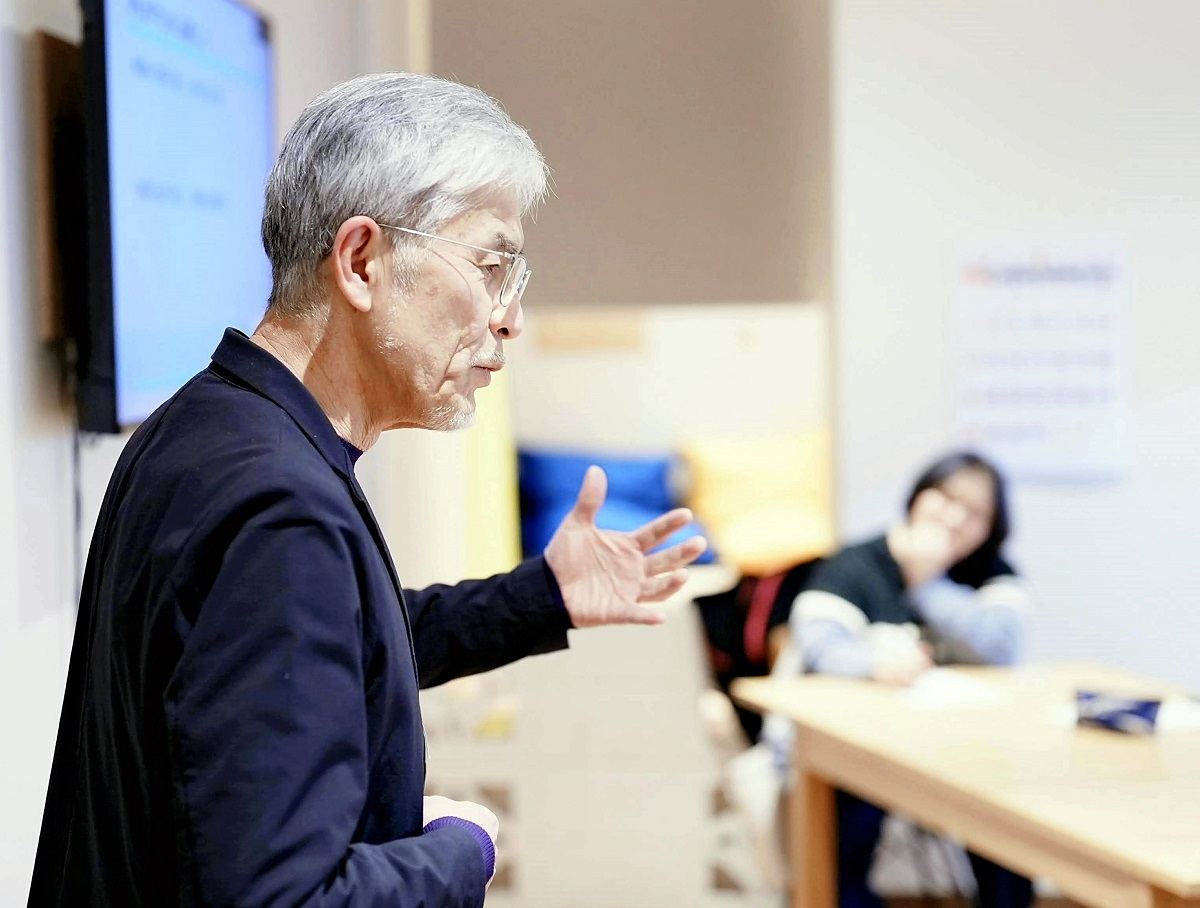

In Osaka, Noriko Takuma shows an illustration she made, saying, “Just after I became a freelancer, I was so worried that I felt like my heart was being squeezed.”
12:03 JST, July 29, 2024
This article focuses on freelancing, a style of working in which people work without belonging to any company or organization. The writer interviewed two people who went freelance after working at companies. They shared their experiences and thoughts about freelancing. Why did they choose to go freelance? What is hard about being a freelancer? Do they think freelancing is rewarding?
***
A room in a condominium in Higashiyodogawa Ward, Osaka, is both home and workplace for Noriko Takuma, 39, a freelance web designer and illustrator.
“It was not my original intention to become a freelancer,” she said. She shared the story of how she ended up going freelance.
After completing graduate school, she joined a company that operated a language school in her hometown of Osaka. In her third year at the company, she was transferred to its Tokyo offices, but she was not able to keep up with the work. She quit the company and returned to Osaka, where she joined another company that imported and exported books.
However, she suffered setbacks at the new company and grew worried about her relationship with her coworkers. On her way to work, she became unable to exit the ticket gate at the closest station to the company. This led to her being diagnosed with social anxiety disorder, which causes fear and anxiety when the affected person is around people in social situations. She quit her job for the second time at age 30.
After working part-time for a while, she went to a publicly funded vocational training school and also took courses offered by a private school to learn about web design. As her health recovered, she thought of looking for a third job. However, she could not be totally sure that the same thing might not happen to her again.
So she decided to work as a freelancer. She started working for clients she had been introduced to by the private school. She communicated with her clients mainly through the internet, such as by online meetings and emails. This workstyle suited Takuma, who is not good at in-person interactions.
Even so, she was worried whether she would be able to continue working as a freelancer, so she participated in events and other gatherings to expand her personal network and receive more jobs.
She has to be in control of when and how much she works. When she is busy, she may spend 15 hours in front of her computer a day, and she often works at night. However, she got married last year and now is seeking a lifestyle that balances work and life to avoid spending too much time apart from her husband. “Freelancing makes it easier for me to make adjustments in my lifestyle. I’m working on those adjustments right now,” she said.
The insecurity freelancers live with

Atsushi Nakano delivers a lecture at seminar
There are people who go freelance just before they reach retirement age.
When Atsushi Nakano of Nara, now 62 years old, was 56, he quit the major mail-order company where he had worked for more than 34 years and became a freelance career consultant.
At his old company, Nakano worked as a system engineer for many years before becoming a manager supervising subordinates in his 40s. While he intended to continue working for the rest of his life, he also thought it would be difficult to keep up with the continuing rapid evolution of information technology if he left the company.
When he was transferred to the human resources department, he obtained a career consultant certification. He thought he might be able to leverage his experience to spend the rest of his life providing career consultation to other people.
After he retired, he first gained some experience in the field when a university commissioned him to do things like providing career consultation for students seeking jobs. He rented an office and set up the necessary equipment. However, when he was about to officially start his business, the COVID-19 pandemic broke out.
He would go days at a time with almost no work. Using personal connections he had established at his previous job, he found work supporting companies that were not used to holding online meetings, which allowed him to make ends meet. He came to understand the insecurity that freelancers live with.
He also discovered something new. At an event for people from different industries, Nakano met a man in his 30s who claimed to have worked more than 50 jobs. At first, Nakano thought he was just “an easily bored young man.” However, as he listened to what the man had to say, he found that the man kept taking on challenges based on his own life plan, with the goal of becoming a talented person capable of multitasking. “My narrow and entrenched views were completely changed, and I thought I should take on more challenges too,” Nakano said.
As a career consultant, he provides consultations for 30 to 40 people a month while also working as a senior model and web writer. He is even involved in activities to help cats at shelters. He lives a colorful life. “I noticed that there are a lot of things I can do in my spare time. I think I am busier now than when I was working for a company,” he said with a smile.
Self-confidence
Mari Hirata, the representative director of an organization of freelance workers, said, “There’s a widely held image of freelancers as people who work alone, but the reality is a little different.” What Hirata said made perfect sense. The two people who shared their stories also participated in networking and other events to build their own personal networks to improve their unstable situations shortly after they started working freelance. It is precisely because they work alone that personal networks are important to them.
Freelancers face insecurity that company employees do not experience. Going freelance is not an easy option for everyone. However, it was clear from the facial expressions of the two freelancers that they are living fulfilling lives now. Perhaps that reflects their self-confidence that they have made decisions on their own and continued working to this day.
Personal networks are key to success
The Internal Affairs and Communications Ministry surveyed freelancers about their situations for the first time as part of its 2022 employment status survey and found there were 2.09 million people whose main work was freelance. “Today, people have diverse values. Some people want to work in their hometowns while others value time spent with their families. It seems to me that more and more people are starting to think freelancing will allow them to live their values,” said Hirata.
On its website, the association explains typical concerns of people who are thinking of working freelance. For example, as for how freelancers get jobs, many say that they use their personal networks. There are also services that match companies who need work done with freelancers who do that kind of work.
When it comes to filing tax returns, you should not try to compile all documents at the last minute before the deadline. It is important to be diligent in your financial record-keeping.
In April 2023, a new law was enacted to make freelance transactions fairer. Under the law, companies are required to specify terms and conditions of a contract, pay remuneration within 60 days and take measures against harassment by people in positions of power. In many cases, freelancers who receive work from companies tend to be in a weaker position and it is important for freelancers to ask for help or advice in case of trouble. The Health, Labor and Welfare Ministry has established a one-stop service called “Freelance Trouble 110” for consultation about troubles between freelance workers and ordering parties.
According to Hirata, important qualities of a freelancer include: (1) constantly trying to improve their skills; (2) being able to bring in other people; and (3) being able to manage themselves.
If someone does not hone their skills to meet their clients’ needs, they will not be able to get jobs. Freelancers seem to work alone, but they actually cooperate with fellow freelancers and sometimes get jobs on referral from them. Also, they do not have superiors or colleagues who care about their work schedules or motivation like company employees do.
Personal networks are key to success
The Internal Affairs and Communications Ministry surveyed freelancers about their situations for the first time as part of its 2022 employment status survey and found there were 2.09 million people whose main work was freelance. “Today, people have diverse values. Some people want to work in their hometowns while others value time spent with their families. It seems to me that more and more people are starting to think freelancing will allow them to live their values,” said Mari Hirata, the representative director of an organization of freelance workers.
On its website, the association explains typical concerns of people who are thinking of working freelance. For example, as for how freelancers get jobs, many say that they use their personal networks. There are also services that match companies who need work done with freelancers who do that kind of work.
When it comes to filing tax returns, you should not try to compile all documents at the last minute before the deadline. It is important to be diligent in your financial record-keeping.
In April 2023, a new law was enacted to make freelance transactions fairer. Under the law, companies are required to specify terms and conditions of a contract, pay remuneration within 60 days and take measures against harassment by people in positions of power. In many cases, freelancers who receive work from companies tend to be in a weaker position and it is important for freelancers to ask for help or advice in case of trouble. The Health, Labor and Welfare Ministry has established a one-stop service called “Freelance Trouble 110” for consultation about troubles between freelance workers and ordering parties.
According to Hirata, important qualities of a freelancer include: (1) constantly trying to improve their skills; (2) being able to bring in other people; and (3) being able to manage themselves.
If someone does not hone their skills to meet their clients’ needs, they will not be able to get jobs. Freelancers seem to work alone, but they actually cooperate with fellow freelancers and sometimes get jobs on referral from them. Also, they do not have superiors or colleagues who care about their work schedules or motivation like company employees do.
Top Articles in JN Specialities
-

Tokyo University of the Arts Now Offering Free Guided Tour of New Storage Building, Completed in 2024
-

Exhibition Shows Keene’s Interactions with Showa-Era Writers in Tokyo, Features Newspaper Columns, Related Materials
-

Step Back in Time at Historical Estate Renovated into a Commercial Complex in Tokyo
-

The Japan News / Weekly Edition (1/30-2/5)
-

Prevent Accidents When Removing Snow from Roofs; Always Use Proper Gear and Follow Safety Precautions
JN ACCESS RANKING
-

Japan PM Takaichi’s Cabinet Resigns en Masse
-

Japan Institute to Use Domestic Commercial Optical Lattice Clock to Set Japan Standard Time
-

Israeli Ambassador to Japan Speaks about Japan’s Role in the Reconstruction of Gaza
-

Man Infected with Measles Reportedly Dined at Restaurant in Tokyo Station
-

Videos Plagiarized, Reposted with False Subtitles Claiming ‘Ryukyu Belongs to China’; Anti-China False Information Also Posted in Japan






















